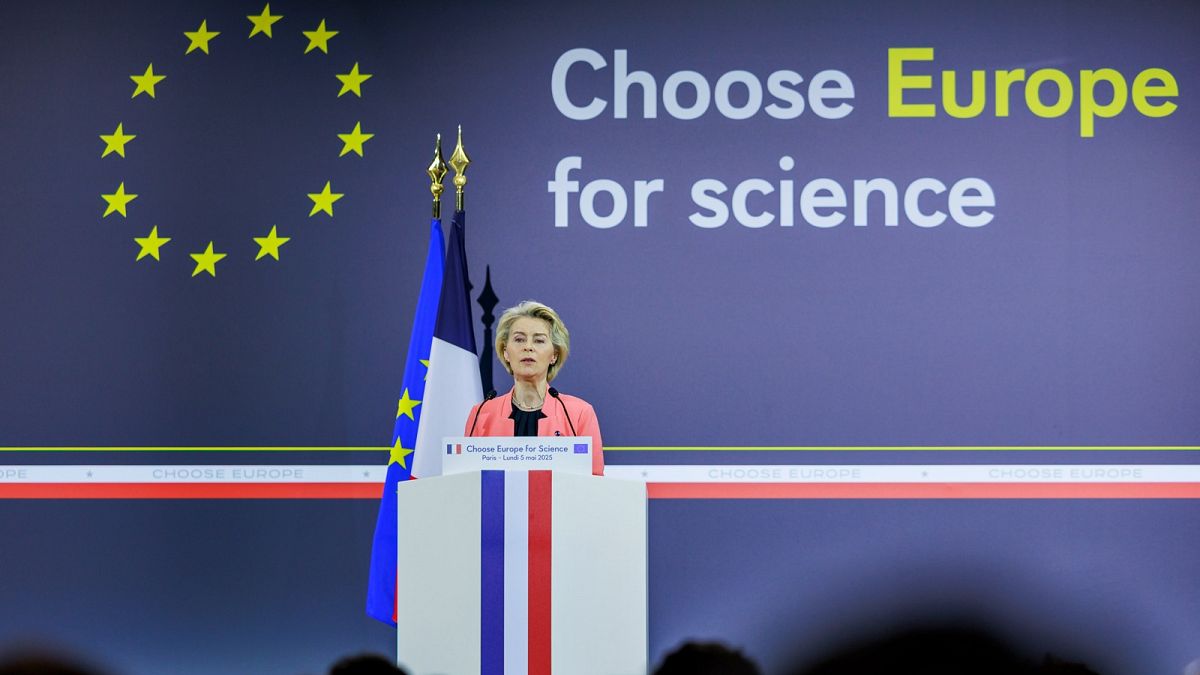Ursula von der Leyen has invited US scientists threatened by Donald Trump’s policies to relocate to the European Union, promising them greater financial incentives, longer contracts, less red tape and a legal commitment to respect their freedom of research.
“More than ever, we need to stand up for science. Science that is universal – shared by all humanity – and that is unifying,” the president of the European Commission said on Monday in a speech delivered at La Sorbonne University in Paris.
“We can all agree that science has no passport, no gender, no ethnicity or political party.”
“We believe that diversity is an asset of humanity and the lifeblood of science. It is one of the most valuable global goods, and it must be protected,” she added.
Von der Leyen did not mention Trump by name, and her spokesperson later said the speech was not about “how science is managed in other countries”.
However, her abundant references to the importance of “free and open” research left little doubt of her ultimate goal: to turn America’s chaos into Europe’s opportunity.
Since his return to the White House, Trump has implemented sweeping cuts to the federal budget that have deprived science agencies, research institutions and medical centres of billions of dollars in grants, imperilling their ability to sustain crucial studies that require reliable and steady funding. Programmes focused on climate change, cancer, Alzheimer’s disease and HIV prevention have already been affected.
In a new request, Trump asked Congress to cut spending by 37% at the National Institutes of Health (NIH) and more than 50% at the National Science Foundation (NSF), a move that the government said it aimed at “refocusing investments” in priority areas, like AI, quantum and nuclear energy, and “ending woke science spending”.
These policies have met with resistance and upended decades of bipartisan consensus, triggering warnings that federal cuts run so deep that they could endanger America’s capacity to compete with other leading economies.
A recent study by the American University estimated that a 25% drop in public R&D spending would shrink the country’s GDP by an “amount comparable” to the decline experienced during the Great Recession.
In parallel, Trump has launched a campaign against elite universities to dismantle their diversity programmes, threatening to slash federal funding and alter their tax regimes.
“Unfortunately, the role of science in today’s world is questioned. The investment in fundamental, free and open research is questioned,” von der Leyen said in Paris.
“What a gigantic miscalculation.”
Von der Leyen then unveiled a new initiative, named “Choose Europe”, to attract scientists and researchers from the US and other countries towards the bloc.
As part of this initiative, she said, the bloc will seek to reduce bureaucratic burdens, facilitate access to venture capital, and offer more long-term contracts and higher allowances. Additionally, the EU will establish a seven-year “super grant” and add a financial “top-up” to the stipend of those who choose to relocate.
Freedom of scientific research will be enshrined in law, she added.
The plan will build upon existing research programmes, mainly the €93-billion Horizon Europe, and include a fresh envelope of €500 million for the 2025-2027 period.
“The first priority is to ensure that science in Europe remains open and free. This is our calling card,” von der Leyen told the audience.
“We must do everything we can to uphold it – now more than ever before.”
French President Emmanuel Macron, who spoke immediately after the Commission chief, was much more explicit in his condemnation.
“Nobody could have imagined, a few years ago, that one of the largest democracies in the world would abolish research programs under the pretext that the word diversity was in that program,” Macron said.
“Nobody could think that this very great democracy in the world, whose economic model is based so strongly on free science and innovation (…) was going to make such a mistake. But here we are.”
The French leader rejected any “diktat” that would empower governments to impose on scientists what they can or cannot research. Macron name-checked two specific fields – women’s health and climate action – that the Trump administration has targeted.
“Lives are also at risk,” he said. “It is the progress of our humanity that is called into question. It is a moral and human imperative.”

